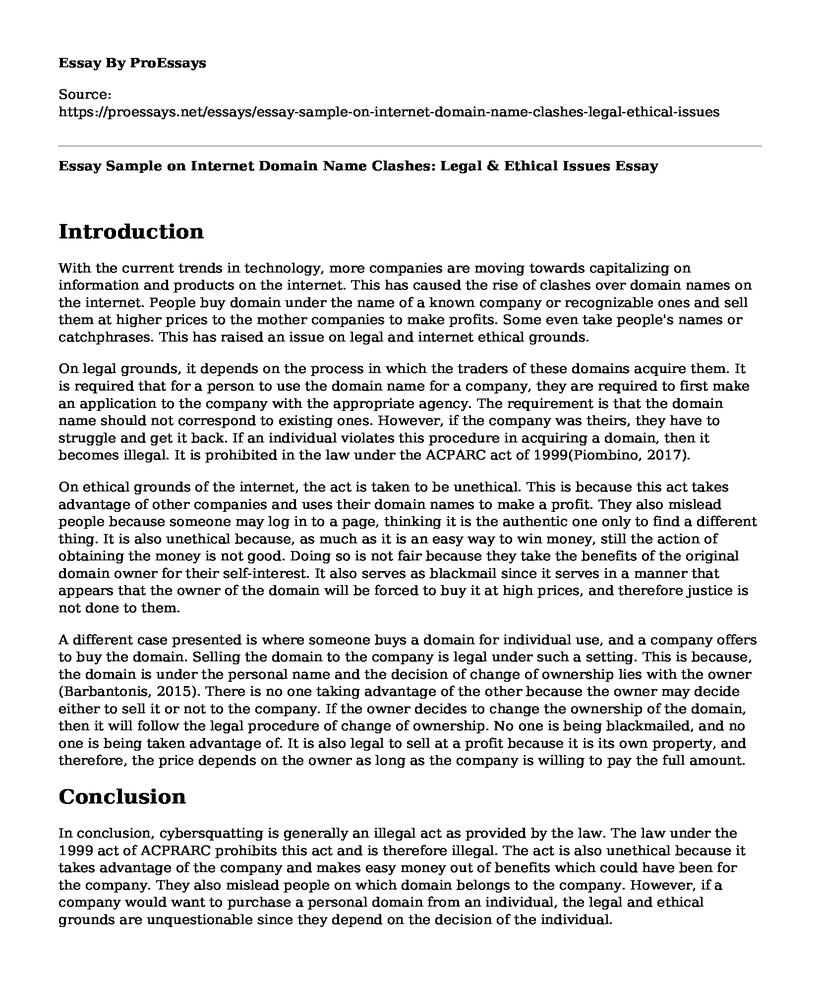Introduction
With the current trends in technology, more companies are moving towards capitalizing on information and products on the internet. This has caused the rise of clashes over domain names on the internet. People buy domain under the name of a known company or recognizable ones and sell them at higher prices to the mother companies to make profits. Some even take people's names or catchphrases. This has raised an issue on legal and internet ethical grounds.
On legal grounds, it depends on the process in which the traders of these domains acquire them. It is required that for a person to use the domain name for a company, they are required to first make an application to the company with the appropriate agency. The requirement is that the domain name should not correspond to existing ones. However, if the company was theirs, they have to struggle and get it back. If an individual violates this procedure in acquiring a domain, then it becomes illegal. It is prohibited in the law under the ACPARC act of 1999(Piombino, 2017).
On ethical grounds of the internet, the act is taken to be unethical. This is because this act takes advantage of other companies and uses their domain names to make a profit. They also mislead people because someone may log in to a page, thinking it is the authentic one only to find a different thing. It is also unethical because, as much as it is an easy way to win money, still the action of obtaining the money is not good. Doing so is not fair because they take the benefits of the original domain owner for their self-interest. It also serves as blackmail since it serves in a manner that appears that the owner of the domain will be forced to buy it at high prices, and therefore justice is not done to them.
A different case presented is where someone buys a domain for individual use, and a company offers to buy the domain. Selling the domain to the company is legal under such a setting. This is because, the domain is under the personal name and the decision of change of ownership lies with the owner (Barbantonis, 2015). There is no one taking advantage of the other because the owner may decide either to sell it or not to the company. If the owner decides to change the ownership of the domain, then it will follow the legal procedure of change of ownership. No one is being blackmailed, and no one is being taken advantage of. It is also legal to sell at a profit because it is its own property, and therefore, the price depends on the owner as long as the company is willing to pay the full amount.
Conclusion
In conclusion, cybersquatting is generally an illegal act as provided by the law. The law under the 1999 act of ACPRARC prohibits this act and is therefore illegal. The act is also unethical because it takes advantage of the company and makes easy money out of benefits which could have been for the company. They also mislead people on which domain belongs to the company. However, if a company would want to purchase a personal domain from an individual, the legal and ethical grounds are unquestionable since they depend on the decision of the individual.
References
Barbantonis, N. F., (2015). Should Contributory Cybersquatting Be Actionable? NCJL & Tech., 17, 79.
Piombino, A. J. (2017). Contributory Liability Under the ACPA: A More Effective Approach to Deterring Cybersquatting at Its Source. Roger Williams UL, Rev., 22, 327.
Cite this page
Essay Sample on Internet Domain Name Clashes: Legal & Ethical Issues. (2023, Jan 14). Retrieved from https://proessays.net/essays/essay-sample-on-internet-domain-name-clashes-legal-ethical-issues
If you are the original author of this essay and no longer wish to have it published on the ProEssays website, please click below to request its removal:
- Essay Sample on Digital Marketing vs Traditional Marketing
- Essay Sample on History of the Computer Hacking
- Learning and Hopfield Networks Essay Example
- Essay Sample on Web Design: Crucial for Establishing Credibility & Growth
- Essay on Secure Mobile Devices: Protect Your Data & Information
- Essay Sample on Ultrasound: A Nurse's Tool to Identify Pressure Injuries
- Report Sample on Creating an Effective Info Security Implementation Plan







